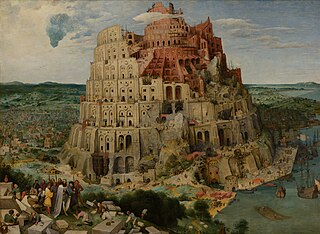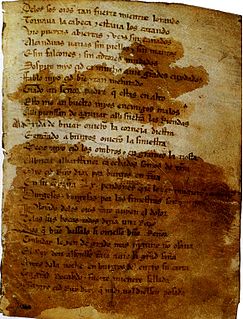Related Research Articles

Nicanor Segundo Parra Sandoval was a Chilean poet and physicist. He was considered one of the most influential Chilean poets of the Spanish language in the 20th century, often compared with Pablo Neruda. Parra described himself as an "anti-poet," due to his distaste for standard poetic pomp and function; after recitations he would exclaim "Me retracto de todo lo dicho".

The Tower of Babel narrative in Genesis 11:1–9 is an origin myth meant to explain why the world's peoples speak different languages.

Mario Orlando Hardy Hamlet Brenno Benedetti Farrugia, was a Uruguayan journalist, novelist, and poet and an integral member of the Generación del 45. Despite publishing more than 80 books and being published in twenty languages he was not well known in the English-speaking world. In the Spanish-speaking world he is considered one of Latin America's most important writers of the latter half of the 20th century.

Félix Rubén García Sarmiento, known as Rubén Darío, was a Nicaraguan poet who initiated the Spanish-language literary movement known as modernismo (modernism) that flourished at the end of the 19th century. Darío had a great and lasting influence on 20th-century Spanish-language literature and journalism. He has been praised as the "Prince of Castilian Letters" and undisputed father of the modernismo literary movement.

El Cantar de mio Cid, literally "The Song of my Cid", or "The Song of my lord", also known in English as The Poem of the Cid, is the oldest preserved Castilian epic poem. Based on a true story, it tells of the deeds of the Castilian hero Rodrigo Díaz de Vivar known as El Cid and takes place during the eleventh century, an era of conflicts in the Iberian Peninsula between the Kingdom of Castile and various Taifa principalities of Al-Andalus. It is considered a national epic of Spain.

Rafael Alberti Merello was a Spanish poet, a member of the Generation of '27. He is considered one of the greatest literary figures of the so-called Silver Age of Spanish Literature, and he won numerous prizes and awards. He died aged 96. After the Spanish Civil War, he went into exile because of his Marxist beliefs. On his return to Spain after the death of Franco, he was named Hijo Predilecto de Andalucía in 1983 and Doctor Honoris Causa by the Universidad de Cádiz in 1985.

Dulce María Loynaz Muñoz was a Cuban poet, and is considered one of the principal figures of Cuban literature. She was awarded the Miguel de Cervantes Prize in 1992. She earned her Doctorate in Civil Law at University of Havana in 1927.
Jaime Sabines Gutiérrez was a Mexican contemporary poet. Known as “the sniper of Literature” as he formed part of a group that transformed literature into reality, he wrote ten volumes of poetry, and his work has been translated into more than twelve languages. His writings chronicle the experience of everyday people in places such as the street, hospital, and playground. Sabines was also a politician.

Pedro Salinas y Serrano was a Spanish poet, a member of the Generation of '27, as well as a university teacher, scholar and literary critic. In 1937, he delivered the Turnbull lectures at Johns Hopkins University. These were later published under the title Reality and the Poet in Spanish Poetry.

Leonese is a set of vernacular Romance language varieties currently spoken in northern and western portions of the historical region of León in Spain and a few adjoining areas in Portugal. In this narrow sense, Leonese is distinct from the dialects grouped under the Asturian language. There is no real linguistic division, though; it is only a purely political and identitary division, as dialectal areas are in fact shaped along a north-south axis. In the past, it was spoken in a wider area, including most of the historical region. The current number of Leonese speakers is estimated at 20,000 to 50,000. The westernmost fringes of the provinces of León and Zamora are in the territory of the Galician language, although there is dialectal continuity between the linguistic areas.
Nancy Morejón is a Cuban poet, critic, and essayist. She was a recipient of the Struga Poetry Evenings Golden Wreath Award.
Clara Janés Nadal, born in Barcelona, is a Spanish writer of several literary genres. She is recognised as a poet and is distinguished as a translator of different central European and eastern languages. Since 2015, she has occupied a seat in the Real Academia Española [1], becoming the tenth woman elected as a member of the RAE.
Emilio García Gómez, 1st Count of Alixares was a Spanish Arabist, literary historian and critic, whose talent as a poet enriched his many translations from Arabic.

José Luis Vega is a Puerto Rican poet.

Alberto Blanco is considered one of Mexico's most important poets. Born in Mexico City on February 18, 1951, he spent his childhood and adolescence in that city, and he studied chemistry at the Universidad Iberoamericana and philosophy at the Universidad Nacional Autónoma de México. For two years, he pursued a master's degree in Asian Studies, specializing in China, at El Colegio de México.1 Blanco was first published in a journal in 1970. He was co-editor and designer of the poetry journal El Zaguan (1975–1977), and a grant recipient of the Centro Mexicano de Escritores, el Instituto Nacional de Bellas Artes, and the Fondo Nacional para la Cultura y las Artes. In 1991 he received a grant from the Fulbright Program as a poet-in-residence at the University of California, Irvine; and, in 1992, he was awarded a grant from the Rockefeller Foundation. He was admitted into the Sistema Nacional de Creadores in 1994, for which he has also been a juror. In 2001 he received the Octavio Paz Grant for Poetry, and in 2008, he was awarded a grant from the Guggenheim Foundation. He remains a member of the Sistema Nacional de Creadores.

Eduardo Anguita Cuéllar was a Chilean poet, who was awarded the Chilean National Prize for Literature in 1988.
The Academia Antártica was a society of writers, poets and intellectuals—mostly of the criollo caste—that assembled in Lima, Peru, in the 16th and 17th Centuries. Their objective was to author a body of literature that matched or surpassed that of Europe's and would prove that literariness indeed thrived in Spain's remotest colonies. Members of this collective together published several anthologies of original writings and translations, the most famous of which are the Primera parte del Parnaso Antártico de obras amatorias and the Segunda parte del Parnaso Antártico de divinos poemas. These are dated 1608 and 1617, respectively.
Carlos Alberto Torres Novoa is a distinguished professor.

Francisco Xavier Alarcón was a Chicano poet and educator. He was one of the few Chicano poets to have "gained recognition while writing mostly in Spanish" within the United States. His poems have been also translated into Irish and Swedish. He made many guest appearances at public schools so that he could help inspire and influence young people to write their own poetry especially because he felt that children are "natural poets."
José María Moreno Carrascal is a Spanish poet, translator, and teacher.